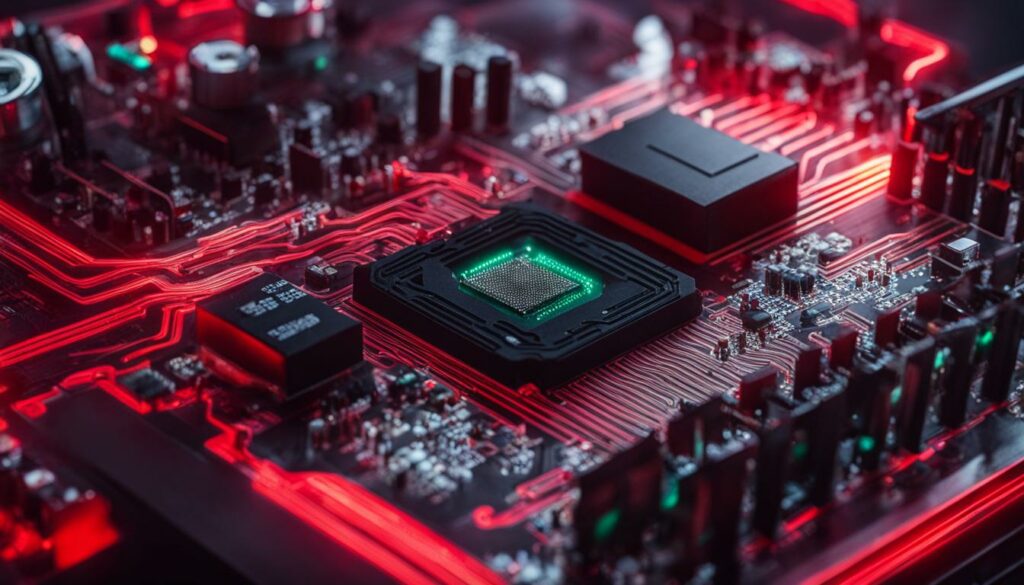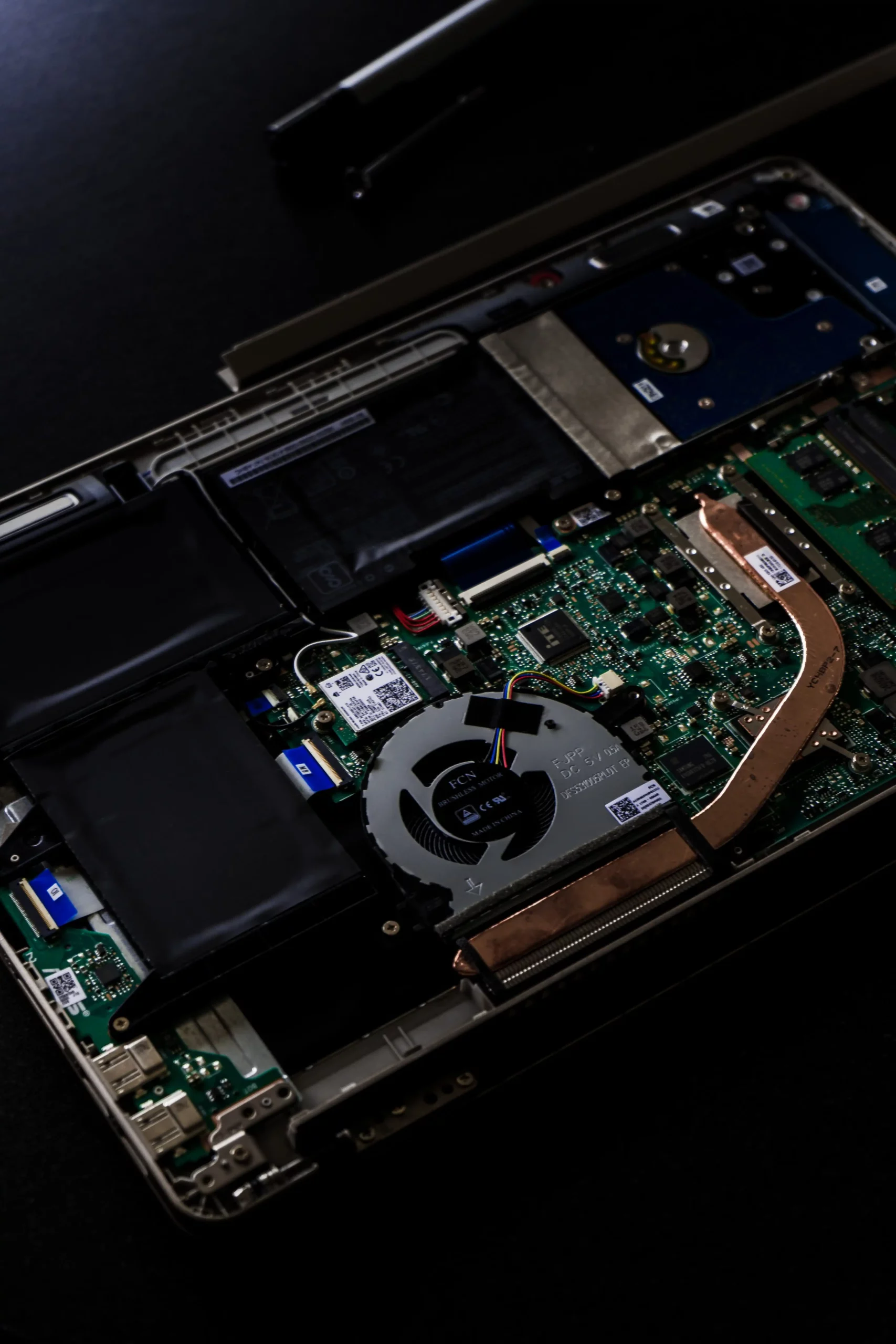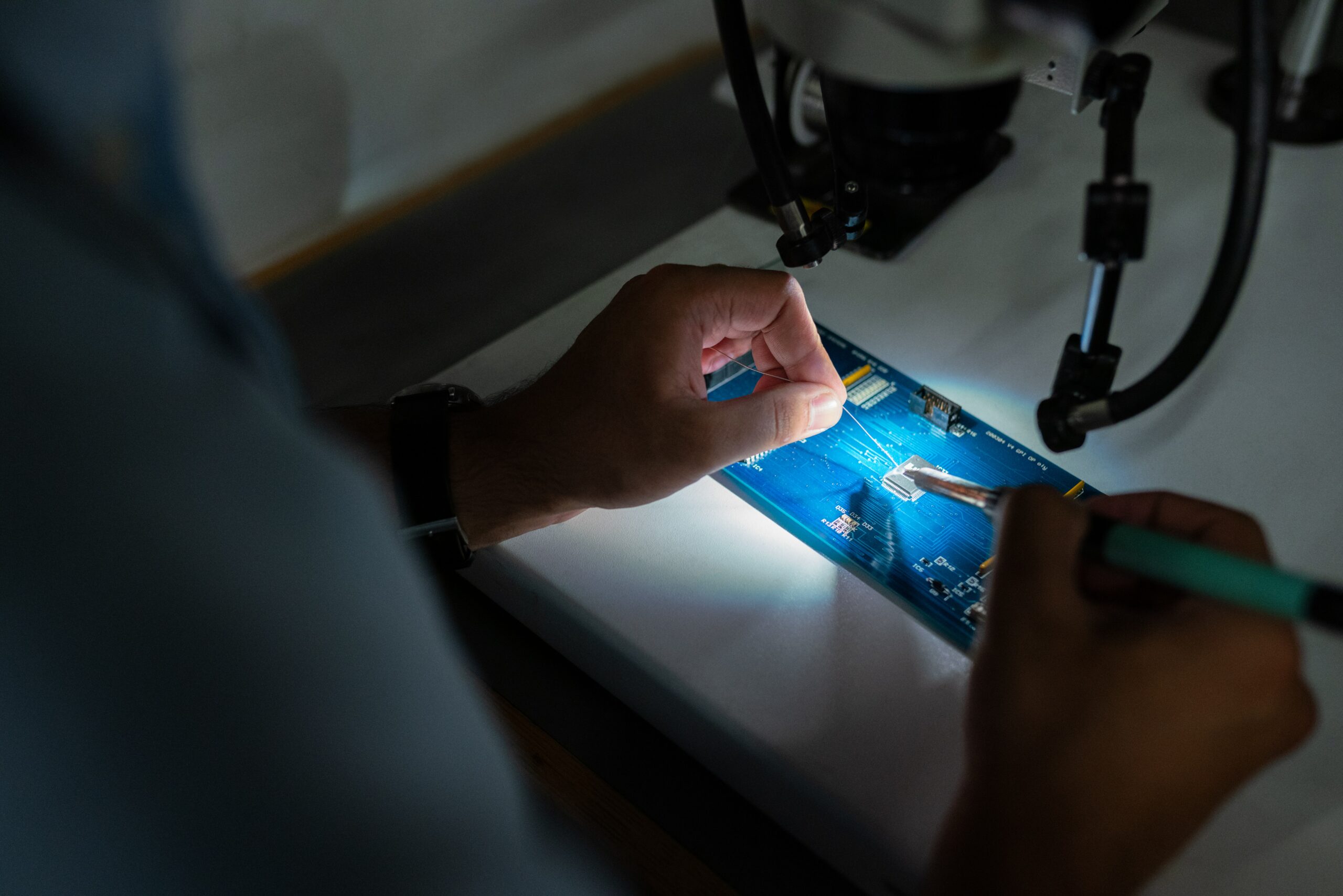Is your computer acting up? Experiencing glitches, slow performance, or strange noises? These could be warning signs your computer needs repair. Don’t wait for a complete breakdown; recognizing these signs early on can save you time, money, and frustration.
Key Takeaways:
- Unusual noises, failure to turn on, slow performance, error codes, freezing or random restarts, program malfunctions, pop-up ads, and strange noises are all signs that your computer may need repair.
- Paying attention to these warning signs can prevent further damage and ensure optimal computer performance.
- Seek professional computer repair services to diagnose and fix any issues promptly.
- Don’t ignore the warning signs and risk data loss or complete system failure.
- Visit gcomsupport.com for more information on computer repair services.
Unusual Noises
If you hear unusual noises coming from your computer, such as loud fan noise or clicking sounds from the hard drive, it could be a sign of a problem that requires repair. These strange noises might indicate issues like overheating, fan malfunction, or a failing hard drive. To prevent further damage and ensure optimal performance, it’s crucial to have your computer checked by a professional if you notice any persistent or unusual noises.
Unusual noises coming from your computer can be a warning sign that it needs repair. These sounds may indicate problems such as overheating, fan malfunction, or a failing hard drive. If you notice persistent or strange noises, consult with a professional to avoid further damage and optimize your computer’s performance.
Failure to Turn On
If your computer fails to turn on, it is a clear indication that there is a problem. Before seeking professional help, check the power source and battery charge to ensure they are functioning properly. If these are not the issues, it is likely a power failure problem that requires repair. New parts may need to be installed or cords replaced to resolve the issue.

If your computer is not working properly, it can be frustrating and disruptive to your daily activities. One of the most common warning signs that your computer needs repair is when it fails to turn on. This can be a result of various issues, including power failure or hardware malfunctions.
Before panicking or assuming the worst, there are a few troubleshooting steps you can take to determine the cause of the problem. Start by checking the power source and ensuring that it is properly connected. Make sure the power cord is securely plugged into both the wall outlet and the back of your computer. If you’re using a laptop, check that the battery is charged or plugged in.
If the power source is not the issue, you may need to open your computer case and examine the internal components. Look for any loose connections or damaged cables that could be preventing power from reaching the motherboard. In some cases, a failing power supply unit (PSU) may need to be replaced.
If you are uncomfortable or unsure about performing these steps yourself, it is best to seek professional help. A computer repair technician can diagnose the problem and provide a solution tailored to your specific situation.
Remember, a failure to turn on is a clear warning sign that your computer needs repair. Ignoring this sign or attempting to fix the issue yourself without proper knowledge and experience can lead to further damage. It’s always best to trust the experts when it comes to your computer’s health and performance.
Slow Performance
A noticeable decline in your computer’s performance can be frustrating and may indicate underlying issues that require attention. Slow boot-up time, frequent freezing, and sluggish task processing are common warning signs that your computer needs repair.
While software issues like viruses can contribute to slow performance, persistent slowness despite minimal programs running suggests a potential hardware problem, particularly a failing hard drive. This hardware-related issue can significantly impact your computer’s speed and overall functionality.
If you are experiencing slow performance, it’s important to take immediate action to prevent further damage to your system and improve its efficiency. Here are a few steps you can take:
- Perform computer troubleshooting: Start by running built-in diagnostic tools and software to identify any software-related issues. This may include malware scans, disk cleanup, or software updates.
- Ensure regular computer maintenance: Regularly clean your computer’s internal components, such as fans and vents, to prevent overheating. Keep your operating system and software up to date to benefit from the latest optimizations and bug fixes.
- Check for common computer problems: Inspect your computer for common issues like a full hard drive, excessive temporary files, or unnecessary startup programs. Addressing these problems can alleviate the strain on your computer’s resources and improve its performance.
If the above steps do not resolve the slow performance issue, it’s highly recommended to seek professional computer repair services. Certified technicians have the expertise to diagnose and fix hardware-related problems effectively.
By addressing slow performance promptly, you can restore your computer’s speed and ensure its optimal performance for everyday tasks and activities.
Error Codes
Error codes appearing when you start up your computer, including the “Blue Screen of Death,” are clear warning signs of a problem that requires immediate repair. These error codes typically signify hardware or software malfunctions. When encountering error codes, it is recommended to write them down and seek professional computer repair services to diagnose and resolve the issue.

Encountering error codes, especially the dreaded “Blue Screen of Death,” can be alarming for computer users. Error codes are indications of underlying hardware or software malfunctions that require attention. These codes often appear during computer startup or while using certain programs, disrupting your workflow and potentially causing data loss. To effectively address the problem, it’s important to document the error codes and consult a professional computer repair service for accurate diagnosis and efficient resolution.
Freezing and Random Restarts
Frequent computer freezing, where the system becomes unresponsive, or random restarts without warning are indications that your computer requires repair. These issues can disrupt workflow and may be caused by hardware malfunctions or other underlying problems. Seeking professional computer repair can help diagnose and resolve these issues effectively.
Computer freezing and random restarts are frustrating experiences that can interrupt your work and potentially lead to data loss. When your computer freezes, it becomes unresponsive, and you may find yourself unable to access any programs or navigate through files. This can be caused by issues such as overheating, incompatible software, faulty hardware, or malware infections.
Random restarts, on the other hand, occur when your computer unexpectedly shuts down and restarts without any warning. This can happen during regular use or even while your computer is idle. Random restarts can be alarming as they can lead to file corruption and data loss if you have any unsaved work.
There are several warning signs that your computer may be experiencing freezing and random restarts:
- Your computer freezes frequently, requiring a manual restart.
- Your computer restarts randomly without any prior indication.
- You notice an increase in system crashes or the “Blue Screen of Death” (BSOD) appears.
- The freezing or random restarts occur during demanding tasks, such as gaming or running resource-intensive software.
- You hear unusual noises coming from your computer, like clicking or grinding sounds.
If you encounter these warning signs, it’s important to take action to address the underlying issues. Here are some steps you can take:
- Check for overheating: Ensure that your computer’s cooling system is functioning properly and that the fans are clean and free from dust buildup. Overheating can cause your computer to freeze or restart unexpectedly.
- Scan for malware: Perform a thorough scan of your computer using reputable antivirus software to detect and remove any malware that may be causing the issues.
- Update drivers and software: Outdated or incompatible drivers and software can contribute to freezing and random restarts. Update your system’s drivers and software to the latest versions.
- Check hardware components: Faulty hardware, such as a failing hard drive or malfunctioning RAM, can lead to freezing and random restarts. If you suspect a hardware issue, consult a professional technician to diagnose and replace any faulty components.
To ensure a proper diagnosis and effective resolution, it’s recommended to seek the assistance of a professional computer repair service. They have the expertise and resources to identify the root cause of the freezing and random restarts and provide suitable solutions.
Program Malfunctions
If specific programs fail to open or exhibit unusual behavior, such as not responding or crashing, it may be a sign of a larger problem. Corrupted or deleted files, as well as any sudden changes in program functionality, suggest the need for computer repair. Restarting the computer may provide temporary relief, but consistent program malfunctions require professional attention.
If you encounter program malfunctions, it is important to consider the following steps:
- Check for software updates: Ensure that the program in question is up to date. Developers often release updates to fix bugs and improve performance.
- Scan for malware: Run a thorough antivirus scan to check for any potential malware or viruses that may be affecting the program’s functionality.
- Reinstall the program: Uninstall the malfunctioning program and then reinstall it. This can help resolve any issues caused by corrupt or missing files.
- Update device drivers: Outdated or incompatible device drivers can also cause program malfunctions. Visit the manufacturer’s website to download and install the latest drivers for your specific hardware.
- Seek professional assistance: If the program continues to exhibit malfunctions despite your best efforts, it is advisable to consult a professional computer repair technician. They have the expertise to identify and resolve complex software-related issues.
Remember, program malfunctions can disrupt your productivity and may indicate underlying computer issues that require attention. Don’t hesitate to seek professional computer repair services to diagnose and resolve these problems effectively.
| Signs of Program Malfunctions | Possible Causes | Solutions |
|---|---|---|
| Program fails to open | Corrupted files Incompatible software Insufficient system resources |
Check for software updates Reinstall the program Upgrade hardware if needed |
| Program crashes or freezes | Memory leaks Incompatible drivers Hardware problems |
Scan for malware Update device drivers Consult a professional technician |
| Unusual behavior or error messages | Software conflicts Registry errors Malware infections |
Uninstall conflicting programs Repair registry errors Run antivirus scans |
Pop-Up Ads
Excessive pop-up ads flooding your computer screen can be alarming and frustrating. But did you know that they could also indicate a more significant problem? If you find yourself constantly bombarded by pop-ups, it could be a warning sign that your computer is infected with a virus or malware. These malicious programs use pop-up ads as a way to deceive and trick users into clicking on them, leading to further damage or unauthorized access.
While some infections can be resolved through personal efforts, it’s crucial to assess the severity of the situation. If you’re uncertain about how to remove the malware or if the problem persists despite your efforts, it’s best to seek professional computer repair services. They have the expertise and tools to effectively eliminate the virus and restore your computer’s performance.
Don’t underestimate the potential danger of pop-up ads. Ignoring them or attempting DIY solutions may only worsen the problem or leave your computer vulnerable to further attacks. Take action and protect your data and privacy by calling in the experts when faced with excessive pop-up ads.
Seeking professional computer repair services means entrusting your device to skilled technicians who can analyze and diagnose the issue accurately. They’ll not only remove the virus or malware but also provide guidance on how to minimize the risk of future infections. By addressing the problem promptly, you can ensure your computer functions flawlessly and safeguard your online activities.
How to Avoid Pop-Up Ads
Prevention is always better than cure. While there’s no foolproof way to avoid pop-up ads completely, you can take several measures to minimize the risk of infection. Here are some essential tips:
- Ensure your computer has reliable antivirus software installed and regularly updated. Antivirus programs are designed to detect and block malware, including those that generate pop-up ads.
- Be cautious when downloading and installing software or applications from the internet. Stick to trusted sources and verify their reputation before proceeding with the installation.
- Avoid clicking on suspicious links or ads, especially those that promise unrealistic offers or prizes. If it seems too good to be true, it probably is.
- Regularly update your operating system and applications to patch any security vulnerabilities that cybercriminals could exploit. Most updates include bug fixes and security enhancements.
- Enable pop-up blockers in your web browser settings. While not foolproof, they can help filter out some intrusive pop-up ads.
By combining these preventive measures with professional computer repair services, you can significantly reduce the risk of pop-up ads and protect your computer from further infections.
Stay Ahead of Computer Problems
Pop-up ads may be a symptom of a more significant issue affecting your computer’s performance and security. Don’t wait for the problem to escalate before taking action. By paying attention to warning signs like excessive pop-up ads, unusual noises, slow performance, program malfunctions, and other computer issues, you can address them promptly and ensure your computer functions optimally.
However, it’s important to note that pop-up ads are just one of many warning signs that your computer needs repair. To provide a comprehensive resource, let’s recap some of the previously discussed warning signs:
- Unusual Noises
- Failure to Turn On
- Slow Performance
- Error Codes
- Freezing and Random Restarts
- Program Malfunctions
Remember, recognizing these warning signs and seeking professional computer repair services can save you time, money, and frustration. Don’t let computer issues hinder your productivity or compromise your data. Take action and ensure your computer is in optimal condition.
Conclusion
Recognizing the warning signs that indicate your computer requires repair is crucial for preventing further issues and maintaining optimal performance. By paying attention to unusual noises, failure to turn on, slow performance, error codes, freezing or random restarts, program malfunctions, pop-up ads, and strange noises, you can take proactive steps to address and resolve these problems.
However, it’s important to remember that computer repair can be complex, and attempting to fix the issues yourself may lead to further damage. It’s highly recommended to seek professional computer repair services to diagnose and fix any issues promptly. By relying on experts in computer troubleshooting and maintenance, you can ensure that your computer functions effectively and prolong its lifespan.
If you’re experiencing any of these warning signs or need assistance with computer repair or maintenance, don’t hesitate to contact GCOM Support. Our team of skilled technicians is ready to diagnose your computer problems and provide efficient solutions to ensure your computer is running smoothly. Visit us at gcomsupport.com for more information and to schedule an appointment today.
FAQ
What are the warning signs your computer needs repair?
Some common warning signs include unusual noises, failure to turn on, slow performance, error codes, freezing or random restarts, program malfunctions, pop-up ads, and strange noises.
What do unusual noises coming from my computer indicate?
Unusual noises, such as loud fan noise or clicking sounds from the hard drive, can indicate a problem that requires repair, such as overheating, fan malfunction, or a failing hard drive.
What should I do if my computer fails to turn on?
Check the power source and battery charge first. If they are functioning properly, it is likely a power failure problem that requires repair, such as installing new parts or replacing cords.
What could be causing slow performance on my computer?
Slow performance, such as slow boot-up time, frequent freezing, or sluggish task processing, can indicate a hardware problem, particularly a failing hard drive. Software issues like viruses can also contribute to slow performance.
What do error codes on my computer indicate?
Error codes, including the “Blue Screen of Death,” indicate hardware or software malfunctions. It is important to write down these codes and seek professional computer repair services for diagnosis and resolution.
What should I do if my computer freezes or restarts randomly?
Frequent computer freezing or random restarts without warning indicate a need for repair. These issues may be caused by hardware malfunctions or other underlying problems that can be diagnosed and resolved by professionals.
What do program malfunctions on my computer indicate?
Program malfunctions, such as specific programs failing to open or exhibiting unusual behavior, suggest a larger problem that requires computer repair. These issues may be caused by corrupted or deleted files or sudden changes in program functionality.
What could excessive pop-up ads on my computer mean?
Excessive pop-up ads can indicate a virus or malware infection. While some infections can be resolved personally, it is best to seek professional computer repair services if you are uncertain or if the problem persists.
How can I prevent further computer issues and ensure optimal performance?
By recognizing warning signs like unusual noises, failure to turn on, slow performance, error codes, freezing or random restarts, program malfunctions, pop-up ads, and strange noises, you can take proactive steps to address and resolve these problems. Seeking professional computer repair services can help diagnose and fix any issues promptly.



